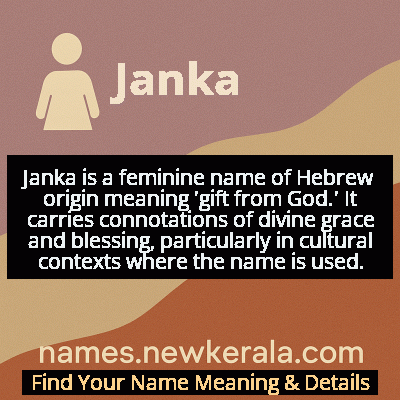Janka Name Meaning & Details
Origin, Popularity, Numerology Analysis & Name Meaning of Janka
Discover the origin, meaning, and cultural significance of the name JANKA. Delve into its historical roots and explore the lasting impact it has had on communities and traditions.
Name
Janka
Gender
Female
Origin
Hebrew
Lucky Number
1
Meaning of the Name - Janka
Janka is a feminine name of Hebrew origin meaning 'gift from God.' It carries connotations of divine grace and blessing, particularly in cultural contexts where the name is used.
Janka - Complete Numerology Analysis
Your Numerology Number
Based on Pythagorean Numerology System
Ruling Planet
Sun
Positive Nature
Leaders, ambitious, highly driven, self-reliant, innovative.
Negative Traits
Overly aggressive, domineering, impatient, selfish.
Lucky Colours
Red, orange, gold.
Lucky Days
Sunday.
Lucky Stones
Ruby, garnet.
Harmony Numbers
2, 3, 9.
Best Suited Professions
Entrepreneurs, managers, engineers.
What People Like About You
Courage, determination, leadership.
Famous People Named Janka
Janka Kupala
Poet and Writer
Belarusian national poet and one of the greatest contributors to modern Belarusian literature
Janka Bryl
Writer and Translator
Prominent Belarusian writer known for his novels and short stories about World War II
Janka Žukowski
Musician and Composer
Belarusian folk musician preserving and modernizing traditional Belarusian music
Janka Siargeeva
Actress
Belarusian theater and film actress known for her roles in national productions
Name Variations & International Equivalents
Click on blue names to explore their detailed meanings. Gray names with will be available soon.
Cultural & Historical Significance
Extended Personality Analysis
Women named Janka are often perceived as creative, resilient, and deeply connected to their cultural roots. They typically exhibit strong artistic sensibilities and intellectual curiosity, with many showing talent in literature, music, or visual arts. Their personality often combines traditional values with progressive thinking, creating a unique blend of respect for heritage and openness to innovation. Jankas are known for their emotional depth and intuitive understanding of others, making them excellent communicators and empathetic friends. They tend to be determined individuals who approach challenges with both practical wisdom and creative problem-solving skills. Their strength of character often inspires others, while their cultural awareness helps them navigate diverse social situations with grace and understanding. These traits are often complemented by a quiet confidence and the ability to maintain personal integrity while adapting to changing circumstances, making Jankas natural leaders in cultural and community contexts.
Modern Usage & Popularity
In contemporary times, Janka remains most popular in Belarus and among Belarusian diaspora communities, where it maintains its cultural significance while adapting to modern naming trends. The name has experienced a resurgence in recent decades as part of broader cultural revival movements in Eastern Europe, particularly following the dissolution of the Soviet Union when many families sought to reconnect with national heritage. While not commonly used in English-speaking countries, it appears occasionally among families with Eastern European heritage, often as a way to honor ancestry while choosing a distinctive name. Modern Jankas often balance traditional values with contemporary lifestyles, and the name continues to be associated with artistic and intellectual pursuits. Its usage reflects ongoing interest in culturally distinctive names that honor heritage while remaining accessible in global contexts, with recent trends showing increased appreciation for names that carry both historical depth and unique phonetic qualities.
Symbolic & Spiritual Meanings
Symbolically, Janka represents divine grace, cultural continuity, and artistic inspiration. The name embodies the concept of being a 'gift from God,' suggesting both spiritual blessing and inherent talent that manifests as creative or intellectual gifts. It symbolizes the preservation of cultural identity through challenging historical periods and serves as a metaphor for creative expression as a form of resistance and renewal. The name carries connotations of wisdom passed through generations, bridging ancient traditions with modern realities while maintaining the essential qualities that define cultural heritage. In metaphorical terms, Janka represents the flowering of cultural heritage and the enduring power of artistic vision to transform and uplift communities, embodying the idea that cultural preservation is itself a form of divine grace that enriches both individual lives and collective identity.

